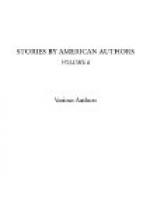At a certain point on the banks of this river, or rather—as it has the habit of abandoning and destroying said banks—at a safe distance therefrom, there is a town from which a railroad takes its departure for its long climb up the natural incline of the Great Plains, to the base of the mountains; hence the importance to this town of the large but somewhat shabby building serving as terminal station. In its smoky interior, late in the evening and not very long ago, a train was nearly ready to start. It was a train possessing a certain consideration. For the benefit of a public easily gulled and enamored of grandiloquent terms, it was advertised as the “Denver Fast Express;” sometimes, with strange unfitness, as the “Lightning Express”; “elegant” and “palatial” cars were declared to be included therein; and its departure was one of the great events of the twenty-four hours, in the country round about. A local poet described it in the “live” paper of the town, cribbing from an old Eastern magazine and passing off as original, the lines—
“Again we stepped into the
street,
A train came thundering
by,
Drawn by the snorting iron steed
Swifter than eagles
fly.
Rumbled the wheels, the whistle
shrieked,
Far rolled the smoky
cloud,
Echoed the hills, the valleys shook,
The flying forests bowed.”
The trainmen, on the other hand, used no fine phrases. They called it simply “Number Seventeen”; and, when it started, said it had “pulled out.”
On the evening in question, there it stood, nearly ready. Just behind the great hissing locomotive, with its parabolic headlight and its coal-laden tender, came the baggage, mail, and express cars; then the passenger coaches, in which the social condition of the occupants seemed to be in inverse ratio to their distance from the engine. First came emigrants, “honest miners,” “cow-boys,” and laborers; Irishmen, Germans, Welshmen, Mennonites from Russia, quaint of garb and speech, and Chinamen. Then came long cars full of people of better station, and last the great Pullman “sleepers,” in which the busy black porters were making up the berths for well-to-do travellers of diverse nationalities and occupations.
It was a curious study for a thoughtful observer, this motley crowd of human beings sinking all differences of race, creed, and habits in the common purpose to move Westward—to the mountain fastnesses, the sage-brush deserts, the Golden Gate.
The warning bell had sounded, and the fireman leaned far out for the signal. The gong struck sharply, the conductor shouted, “All aboard,” and raised his hand; the tired ticket-seller shut his window, and the train moved out of the station, gathered way as it cleared the outskirts of the town, rounded a curve, entered on an absolutely straight line, and, with one long whistle from the engine, settled down to its work. Through the night hours it sped on, past lonely ranches and infrequent stations, by and across shallow streams fringed with cottonwood trees, over the greenish-yellow buffalo grass; near the old trail where many a poor emigrant, many a bold frontiersman, many a brave soldier, had laid his bones but a short time before.




